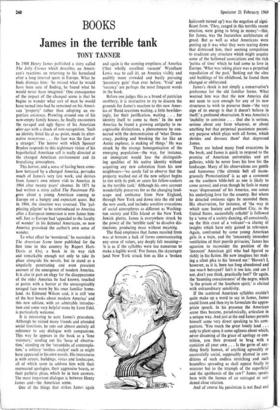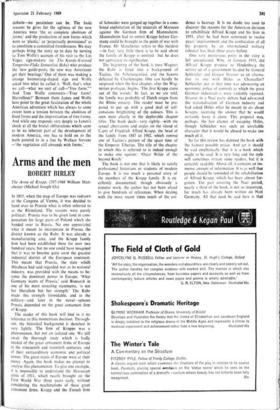James in the terrible tank BOOKS
TONY TANNER
In 1908 Henry James published a story called The Jolly Corner which describes an Ameri- can's reactions on returning to his homeland after a long interval spent in Europe. What he finds dismays him : 'he missed what he would have been sure of finding, be found what he would never have imagined.' One consequence of the impact of the changed scene is that he begins to wonder what sort of man he would have turned into had he remained on his Ameri- can 'property' rather than adopting an ex- patriate existence. Prowling around one of his now-empty family houses, he finally encounters the ravaged and ugly figure of his American alter ego with a shock of non-recognition. 'Such an identity fitted his at no point, made its alter- native monstrous . . . the face was the face of a stranger.' The horror with which Spencer Brydon responds to this nightmare vision of his hypothetical American self is really directed at the changed American environment and its brutalising atmosphere.
This horror, and a sense of having been some- how betrayed by a changed America, pervades much of James's very late work, and derives from James's own return visit to America in 1904 after twenty years' absence. In 1871 he had written a story called The Passionate Pil- grim about a young American coming to Europe on a hungry and expectant quest. But in 1904, the situation was reversed. The 'pal- pitating pilgrim' to be reintroduced to America after a European immersion is now James him- self. Just as Europe had 'appealed to the faculty of wonder' in his fictional Americans, so now America provoked the author's own sense of wonder.
To what effect he 'wondered,' he recorded in The American Scene (now published for the first time in this country by Rupert Hart- Davis at 63s), a book in its way rich and remarkable enough not only to take its place alongside his novels, but to stand as a singularly penetrating and even prescient account of the emergence of modern America. It is also in part an elegy for the disappearance of the older America he had known, touched at points with a horror at the unrecognisably ravaged face worn by his once familiar home- land. As Edmund Wilson said, it is still 'one of the best books about modem America' and this new edition, with an admirable introduc- tion and some very helpful notes by Leon Edel, is particularly welcome.
It is interesting to note James's procedure. Although he visited many friends and attended social functions, he cuts out almost entirely all reference to any dialogue with companions. This way he appears in the book as a 'lone visionary,' sending out his 'lasso of observa- tion,' standing on the 'verandahs of contempla- tion,' a solitary 'restless analyst' such as might have appeared in his own novels. His intercourse is with streets, buildings, vistas and landscapes, all of which seem to address him with their murmured apologies, their aggressive boasts, or their pathetic pleas, which he in turn answers. The most important dialogue is between Henry James and—the American scene.
One of the things that strikes James again and again is the seeming emptiness of America ('that wholly excellent vacuum' Wyndham Lewis was to call it), an America visibly and audibly more crowded and busily pursuing 'pecuniary gain' than ever before. 'Void' and 'vacancy' are perhaps the most frequent words in the book.
Before one judges this as a brand of patrician snobbery, it is instructive to try to discern the grounds for James's reaction to this new Amer- ica of 'florid creations waiting, a little bewilder- ingly, for their justification, waiting . . . for identity itself to come to them.' In the new America he found a growing antipathy to re- cognisable distinctions, a phenomenon he con- nected with the demonstration of 'what Demo- cracy, pushing and breaking the ice like an Arctic explorer, is making of things.' He was struck by the strange homogenisation of the emerging population—the way, for instance, an immigrant would lose the distinguish- ing qualities of his native identity without acquiring any new coloration from his new neighbours—'we surely fail to observe that the property washed out of the new subject begins to tint with its pink or azure his fellow-soakers in the terrible tank.' Although his own account wonderfully preserves for us the changing land- scape and ambiance from New England, through New York and down into the old and the new south, and includes sensitive evocations of social atmospheres as different as Washing- ton society and Ellis Island or the New York Jewish ghetto, James is everywhere struck by the power of the 'terrible tank' to dissolve dis- tinctions, producing mass without meaning.
The fluid emptiness that James recoiled from was at bottom a lack of forms communicating any sense of values, any deeply felt meaning— 'it is as if the syllables were too numerous to make a legible word.' For James, the skyscraper (and New York struck him as like a 'broken haircomb turned up') was the negation of signi- ficant form. 'They, ranged in this terrible recent erection, were going to bring in money'--this, for James, was the featureless architecture of greed. But as well as what Americans were putting up it was what they were tearing down that distressed him, their seeming compulsion to eradicate any structure which might acquire some of the hallowed associations and the rich 'patina of time' which he had come to love in Europe. 'What was taking place was a perpetual repudiation of the past.' Seeking out the sites and buildings of his childhood, he found them changed or obliterated.
James's shock is not simply a conservative's preference for the old familiar forms. What worried him was that the new America did not seem to care enough for any of its new structures to wish to preserve them—`the very sign of its energy is that it doesn't believe in itself,' a profound observation. It was America's 'inability to convince . . . that she is serious, serious about any form whatever, or about anything but that perpetual passionate pecuni- ary purpose which plays with all forms, which derides and devours them' that depressed James.
There are indeed many fond evocations in the book, and James is quick to respond to the promise of American universities and art galleries, while he never loses his love for the landscape. Many of his observations are gentle and humorous ('the citronic belt all incon- gruously Protestantized' is as apt a comment on the southern bible-belt as one is likely to come across), and even though he feels in many ways 'dispossessed' of his America, one senses his underlying love for the country. But where he detected ominous signs he recorded them. His observation, for instance, of 'the way in which sane Society and pestilent City, in the United States, successfully cohabit' is followed by a 'sense of a society dancing, all consciously, on the thin crust of a volcano'—a clustei of insights which have only gained in relevance. Again, confronted by some young American girls in a train, and the 'innocently immodest ventilation of their puerile privacies,' James has ofcasion to reconsider the position of the 'innocent' American girl who had figured so richly in his fiction. He now imagines her mak- ing a silent plea to his 'inward ear.' Haven't I, however, as it is, been too long abandoned and too much betrayed? Isn't it too late, and am I not, don't you think, practically lost?' Or again, the `haunting consciousness' of the negro, which 'is the prison of the Southern spirit,' is elicited with extraordinary sensitivity.
If the scattered American syllables couldn't quite make up a word to say to James, James could listen and then try to formulate the appro- priate speech. In his presence the American scene thus became, paradoxically, articulate in a unique way. And just at the end James permits himself some very direct speaking to his com- patriots. `You touch the great lonely land . . . only to plant upon it some ugliness about which, never dreaming of the grace of apology or con- trition, you then proceed to brag with a cynicism all your own . . . Is the germ of any- thing finely human, of anything agreeably or successfully social, supposably planted in con- ditions of such endless stretching and such boundless spreading as shall appear finally to minister but to the triumph of the superficial and the apotheosis of the raw?' James speak.s here with the licence of an outraged or sad- dened close relation.
And of course his pessimism is not final and definite—no pessimism can be. The basic reasons he gives for the ugliness of the new America were 'the so complete abolition a forms,' and the production of new forms which were so 'plastic,' so 'perpetually provisional' as to constitute a committed formlessness. We may perhaps bring the story up to date by turning to Tom Wolfe's account of his visit to the Las Vegas sign-makers (in The Kandy-Kolored Tangerine-Flake Streamline Baby) who produce the 'new guide-posts, the new way Americans get their bearings. One of them was making' a strange boomerang-shaped sign and Wolfe asked him what he called it. 'Well, that's what we call—what we sort of call—"free form."' And Tom Wolfe comments—Tree form! Marvellous!' Between them James and Wolfe here point to the great fascination of the whole American adventure which has always to some extent been a tension between the abolition of fixed forms and the improvisation of free forms. And while one responds very deeply to James's shock at all the brutal obliterations which seem to be an inherent part of the development of modern America, one has to hold on to the truth pointed to in a line by Wallace Stevens =the vegetation still abounds with forms.'



































 Previous page
Previous page